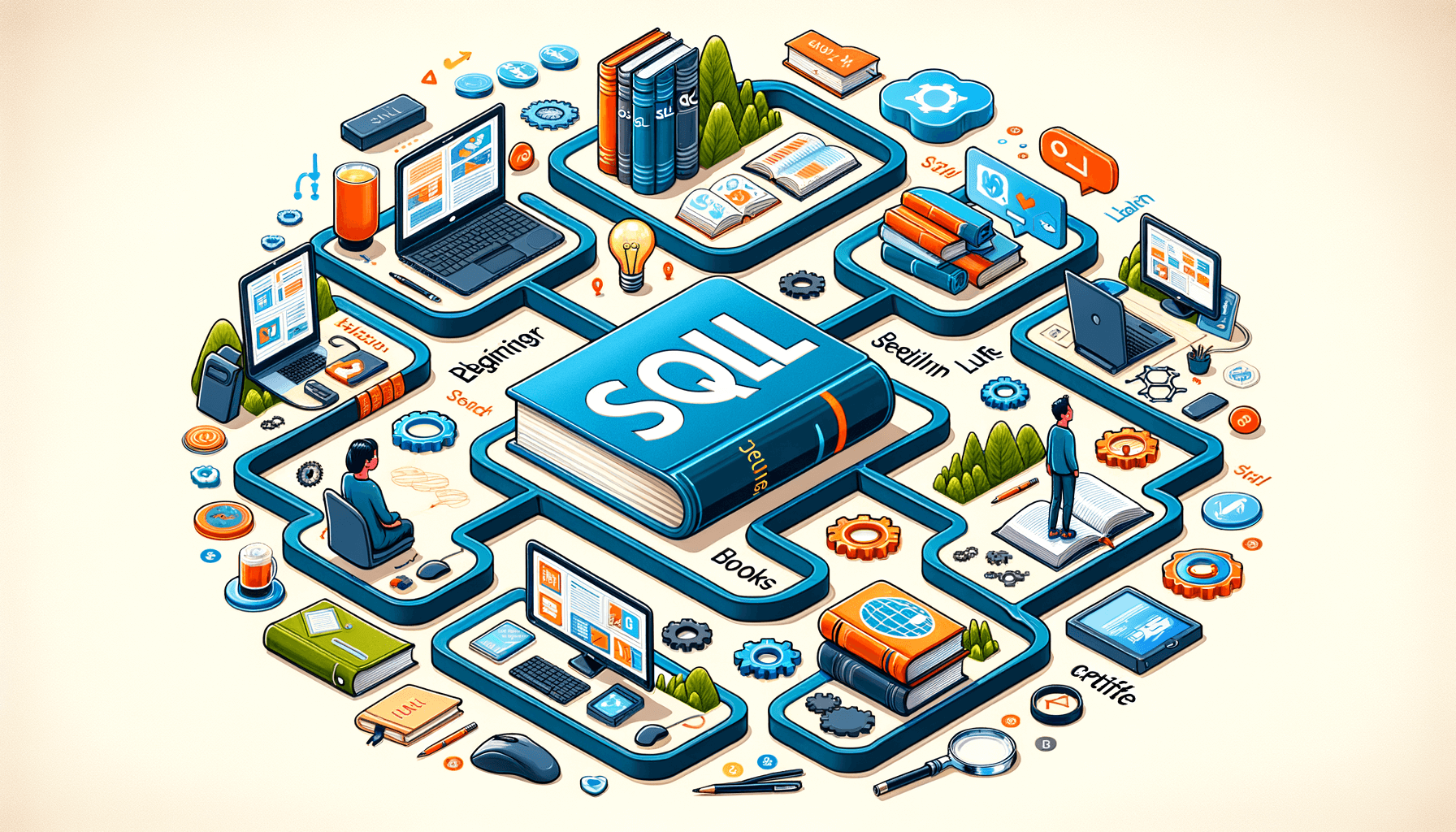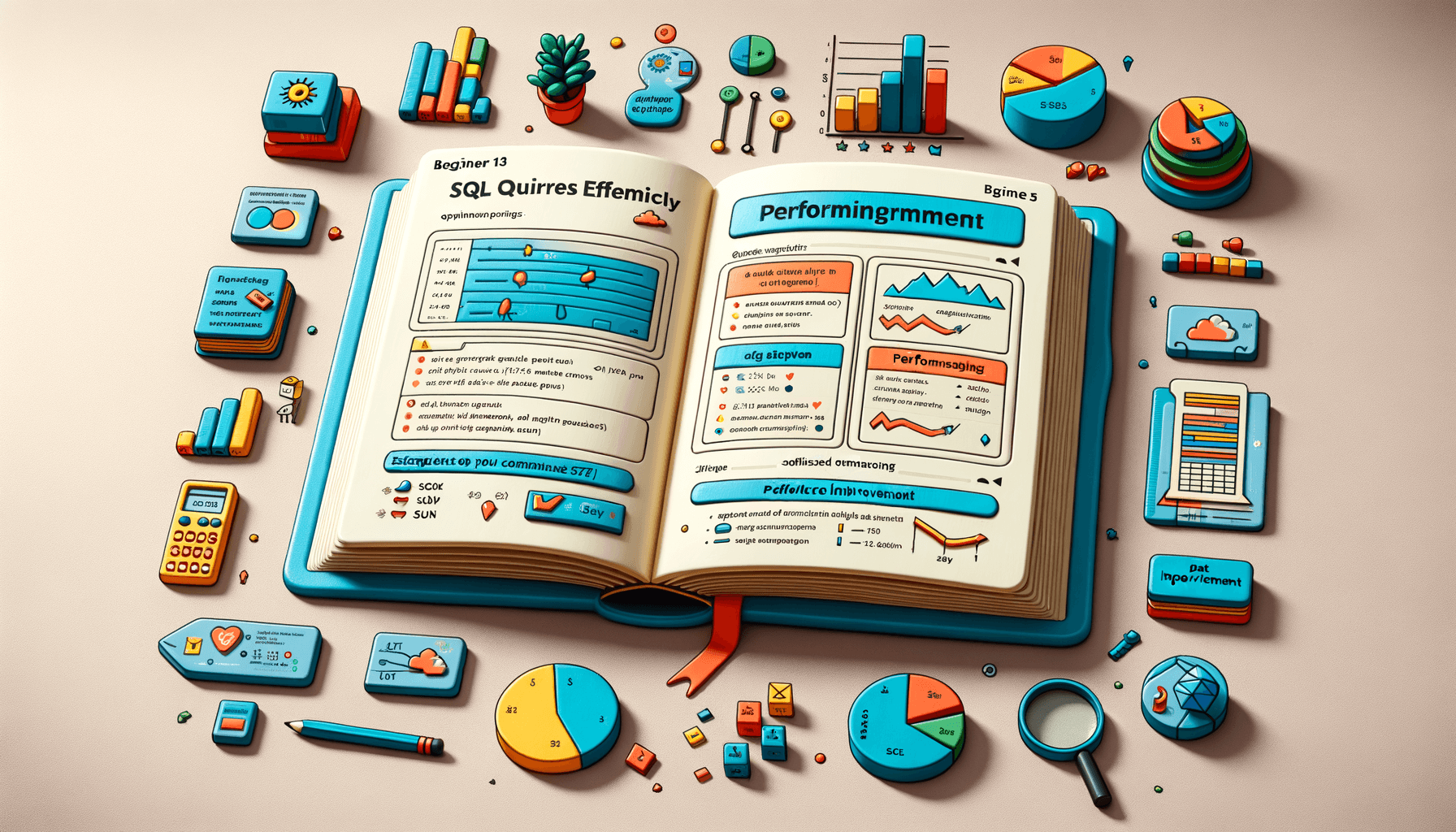A big variety of articles and resources

Where can I learn SQL from basic to advanced?
 Sia Author and Instructor
Learn SQL
Sia Author and Instructor
Learn SQL
13 minute read
SQL, or Structured Query Language, is a powerful tool used to manage and manipulate databases. Learning SQL can open up many opportunities, especially in fields like data science, web development, and business intelligence. This article will guide you through various resources and methods to learn SQL from the basics to advanced levels.
Key Takeaways
- SQL is a must-know skill for anyone working with data.
- You can start learning SQL through online courses, books, and workshops.
- Hands-on practice is crucial for mastering SQL.
- Community forums and online groups can provide extra help and support.
- Advanced SQL skills include query optimization and understanding big data.
Understanding SQL and Its Importance
Definition and History of SQL
Structured Query Language (SQL) is a standard language for managing and manipulating databases. It was developed in the 1970s by IBM researchers. Over the years, SQL has become the go-to language for database management systems.
Role of SQL in Data Management
SQL plays a crucial role in data management by allowing users to create, read, update, and delete data in a database. It is essential for organizing and retrieving large amounts of data efficiently. Without SQL, managing data would be a daunting task.
Benefits of Learning SQL
Learning SQL offers numerous benefits. It enhances your ability to handle data, which is a valuable skill in today's data-driven world. Additionally, SQL knowledge opens up various career opportunities in fields like data analysis, web development, and business intelligence. Mastering SQL can significantly boost your career prospects.
Understanding SQL is fundamental for anyone looking to work with databases. It provides the tools needed to manage and manipulate data effectively.
sqlskillz.com vs udemy.com: master sql basics, perfect for beginners, learn at your own pace. no credit card required. login or sign up to start learning.
Foundational Concepts in SQL
Basic SQL Syntax and Commands
When we start learning SQL, the first thing we need to understand is its basic syntax and commands. These are the building blocks for writing any SQL query. Mastering these basics will make it easier to tackle more complex queries later on.
Data Types and Structures
In SQL, data types and structures are crucial. They define the kind of data we can store in a database. Knowing the different data types helps us organize and manage data more effectively.
Introduction to SQL Queries
Writing SQL queries is like asking questions to a database. We use queries to retrieve, update, or delete data. A quick introduction to SQL for beginners can help us get started with simple queries, setting a foundation for future learning.
Understanding these foundational concepts is essential for anyone looking to dive deeper into SQL. They provide the groundwork for more advanced topics and practical applications.
Online Platforms for Learning SQL
Massive Open Online Courses (MOOCs)
MOOCs are a great way to start learning SQL. They offer courses from top universities and institutions. These courses are often free, but you can pay for a certificate. Some popular MOOC platforms include Coursera, edX, and Udacity. These platforms provide structured learning paths and often include quizzes and projects to test your knowledge.
Interactive Learning Websites
Interactive websites make learning SQL fun and engaging. They allow you to write and run SQL queries directly in your browser. Some well-known interactive learning sites are Codecademy, Khan Academy, and SQLZoo. These platforms are great for beginners because they offer instant feedback and a hands-on approach.
University-Sponsored Online Courses
Many universities offer online SQL courses that you can take at your own pace. These courses are usually more in-depth and may include video lectures, readings, and assignments. Websites like MIT OpenCourseWare and Stanford Online provide high-quality educational content. University-sponsored courses often come with a higher level of credibility and can be a good addition to your resume.
Books and Publications on SQL
Recommended Beginner Books
For those just starting out with SQL, there are several excellent books that can help you build a strong foundation. "SQL for Dummies" is a popular choice for beginners, offering clear explanations and practical examples. Another great option is "Learning SQL" by Alan Beaulieu, which covers basic concepts and provides hands-on exercises.
Advanced SQL Literature
Once you have a good grasp of the basics, you might want to dive into more advanced topics. "SQL Performance Explained" by Markus Winand is a fantastic resource for understanding how to optimize your SQL queries. For those interested in data warehousing, "The Data Warehouse Toolkit" by Ralph Kimball is a must-read.
Journals and Articles
Staying updated with the latest trends and techniques in SQL is crucial. Journals like the ACM Transactions on Database Systems publish cutting-edge research in the field. Additionally, websites like SQLServerCentral and Database Journal offer a wealth of articles and tutorials to keep your skills sharp.
Reading a mix of beginner and advanced books, along with current articles, can provide a well-rounded understanding of SQL. This approach ensures that you not only learn the basics but also stay updated with the latest advancements in the field.
SQL Certification Programs
Overview of Certification Bodies
When it comes to SQL certifications, several organizations offer recognized programs. These bodies ensure that the certification process is thorough and up-to-date with industry standards. Some of the most well-known certification bodies include Microsoft, Oracle, and IBM. Each of these organizations provides a range of certifications that cater to different skill levels and areas of expertise.
Popular SQL Certifications
There are several popular SQL certifications that can help you advance your career. Some of the most sought-after certifications include:
- Microsoft Certified: Azure Data Scientist Associate
- Oracle Database SQL Certified Associate
- IBM Certified Database Administrator
These certifications are highly valued in the industry and can open up numerous job opportunities.
Preparation Tips for Certification Exams
Preparing for SQL certification exams requires a strategic approach. Here are some tips to help you get started:
- Understand the Exam Format: Familiarize yourself with the structure and types of questions that will be asked.
- Study the Official Guide: Use the official study materials provided by the certification body.
- Practice Regularly: Consistent practice can help reinforce your knowledge and improve your confidence.
- Join Study Groups: Collaborating with others can provide new insights and make studying more enjoyable.
Earning a SQL certification can significantly boost your career prospects and demonstrate your expertise to potential employers. It's a worthwhile investment in your professional development.
SQL Workshops and Bootcamps
Short-Term Intensive Programs
SQL workshops and bootcamps are great for those who want to learn quickly. These programs usually last from a few days to a few weeks. They cover a lot of material in a short time. This makes them perfect for busy people.
Hands-On Learning Experiences
In these workshops, you get to practice what you learn. This hands-on approach helps you understand SQL better. You will work on real projects and solve real problems. This way, you can see how SQL is used in the real world.
Choosing the Right Workshop
Not all workshops are the same. Some focus on beginners, while others are for advanced learners. It's important to pick the right one for your skill level. Look at the course outline and see if it matches what you want to learn. Also, check reviews from past students to see if the workshop is good.
Community Resources and Forums
Online SQL Communities
Engaging with online SQL communities can be a game-changer for your learning journey. These platforms offer a space to ask questions, share knowledge, and connect with other learners. Joining these communities can provide real-time support and feedback as you work through SQL challenges.
Discussion Forums and Q&A Sites
Discussion forums and Q&A sites are invaluable for troubleshooting and learning from others' experiences. Websites like sqlskillz.com vs codecademy.com: master sql basics at your own pace. no credit card required. login or sign up to start learning. sign up to sqlskillz for free. Stack Overflow and Reddit have dedicated sections for SQL where you can find answers to common problems and advanced topics alike.
Networking with SQL Professionals
Networking with SQL professionals can open doors to mentorship and career opportunities. Attend virtual meetups, webinars, and conferences to connect with experts in the field. Building these relationships can provide insights into industry trends and best practices.
Engaging with the SQL community not only enhances your learning but also keeps you updated with the latest developments in the field.
Practical Applications of SQL
SQL in Business Intelligence
SQL is a powerful tool in the world of business intelligence. It helps us to extract and analyze data, making it easier to make informed decisions. By using SQL, we can create detailed reports and dashboards that provide insights into various aspects of a business. This allows companies to track performance, identify trends, and make strategic decisions based on data.
SQL for Data Analysis
When it comes to data analysis, SQL is indispensable. It allows us to query large datasets quickly and efficiently. With SQL, we can filter, sort, and aggregate data to find the information we need. This makes it easier to understand complex data sets and draw meaningful conclusions. SQL's versatility in handling different types of data makes it a valuable skill for any data analyst.
SQL in Web Development
In web development, SQL plays a crucial role in managing databases. It allows us to store, retrieve, and manipulate data for web applications. Whether it's a simple blog or a complex e-commerce site, SQL helps us manage user information, product details, and transaction records. By integrating SQL with other programming languages, we can create dynamic and interactive web applications that provide a seamless user experience.
Learning SQL basics with real-world projects can give us the essential knowledge and confidence needed to succeed in data management. Expert-led training ensures we gain practical skills that are immediately applicable in various tech fields.
Advanced SQL Techniques and Best Practices
In this section, we delve into advanced techniques and best practices for SQL. Understanding how to optimize SQL queries is crucial for efficient database management. Additionally, mastering advanced data manipulation skills can enhance the way we interact with and extract insights from data. Security practices in SQL are essential to protect sensitive information and maintain data integrity. By implementing these best practices, we can ensure the smooth operation of our databases and safeguard against potential threats.
SQL in the Context of Big Data
SQL and NoSQL Databases
In the world of big data, we often hear about SQL and NoSQL databases. SQL databases are great for structured data and complex queries. On the other hand, NoSQL databases are better for unstructured data and can handle large volumes of information. Each type has its own strengths and weaknesses, and choosing the right one depends on the specific needs of your project.
SQL for Big Data Analytics
When it comes to big data analytics, SQL is a powerful tool. It allows us to query and analyze large datasets efficiently. With SQL, we can perform complex operations like joining tables, filtering data, and aggregating results. This makes it easier to gain insights and make data-driven decisions. In fact, many big data platforms, like Hadoop and Spark, support SQL queries, making it a versatile choice for data analysis.
Future Trends in SQL and Big Data
The future of SQL in big data looks promising. As data continues to grow, there is a need for more advanced SQL techniques to handle it. We are seeing trends like the integration of SQL with machine learning and artificial intelligence. This opens up new possibilities for predictive analytics and automated decision-making. Additionally, there is a focus on improving the scalability and performance of SQL databases to meet the demands of big data applications.
In the ever-evolving landscape of big data, SQL remains a crucial tool for managing and analyzing large datasets. Its ability to handle complex queries and integrate with other technologies makes it indispensable in the field of data analytics.
Learning SQL Through Real-World Projects
Project-Based Learning Approach
When we learn SQL through real-world projects, we get to apply what we've learned in a practical way. This method helps us understand how SQL works in real situations. By working on projects, we can see the results of our SQL queries and improve our skills.
Case Studies and Examples
Looking at case studies and examples can show us how SQL is used in different fields. We can learn from these examples and apply similar techniques to our own projects. This helps us see the many ways SQL can be used.
Building a Portfolio with SQL Projects
Creating a portfolio of SQL projects is a great way to show our skills. We can include different types of projects to show our range. This portfolio can be useful when we are looking for jobs or trying to show our expertise in SQL.
Working on real-world projects not only improves our SQL skills but also gives us a better understanding of how data is managed in various industries.
Dive into the world of SQL with hands-on projects that mirror real-life scenarios. Our courses are designed to help you master SQL skills quickly and effectively. Ready to start your journey? Visit our website to explore our offerings and sign up today!
Conclusion
Learning SQL from basic to advanced is a journey that can open many doors in the tech world. Whether you choose online courses, books, or coding bootcamps, there are plenty of resources available to help you master SQL. Remember to practice regularly and apply what you learn to real-world problems. This will not only help you understand the concepts better but also make you more confident in using SQL. With dedication and the right resources, anyone can become proficient in SQL.
Frequently Asked Questions
What is SQL?
SQL stands for Structured Query Language. It's a language used to communicate with databases and manage data.
Why should I learn SQL?
Learning SQL is important because it helps you handle and analyze data. It's widely used in many jobs, especially in tech and business.
Where can I start learning SQL?
You can start learning SQL online through courses on websites like Coursera, Udemy, and Khan Academy. There are also many free tutorials available.
Are there any good books for beginners?
Yes, there are many good books for beginners. Some popular ones are 'SQL for Dummies' and 'Learning SQL' by Alan Beaulieu.
Can I get certified in SQL?
Yes, you can get certified in SQL. Many organizations offer certifications, like Microsoft and Oracle. These can help you get a job.
What are some advanced SQL topics?
Some advanced SQL topics include query optimization, advanced data manipulation, and security practices. These topics help you become more skilled in SQL.
Is SQL used in big data?
Yes, SQL is used in big data. It's often used with big data tools to analyze large datasets and find insights.
How can I practice SQL?
You can practice SQL by working on real-world projects, doing exercises on interactive websites, and participating in online communities.
Related Articles

A Beginner's Guide to Running a SQL Query Efficiently
8 minute read

Effective Ways to Enhance Your Skills with SQL Practice
9 minute read





